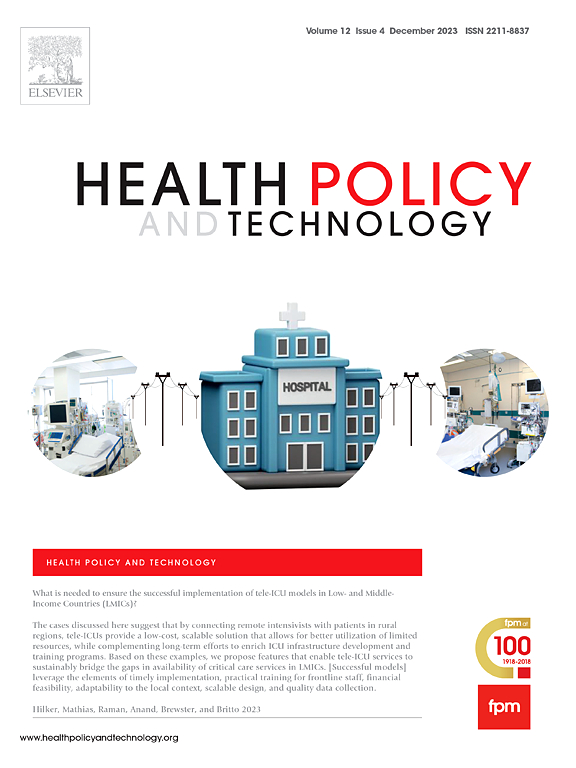以价值为基础的肿瘤医疗:它能否推动中东和北非地区的变革性转变?
IF 3.4
3区 医学
Q1 HEALTH POLICY & SERVICES
引用次数: 0
摘要
20 世纪 90 年代出现了从数量驱动型医疗保健向价值驱动型医疗保健或价值医疗保健(VBHC)的转变,将医疗保健的质量置于数量之上。VBHC 得到了各医疗利益相关方的支持,强调以患者为中心,与个人健康体验产生共鸣的结果。癌症是全球主要死因之一,中低收入国家(LMICs)承受着沉重的负担,尤其是中东和北非(MENA)地区,由于冲突、人口结构变化和环境因素,该地区的癌症病例预计将激增。在生物标记物和靶向疗法的推动下,中东和北非地区的肿瘤市场有望实现增长。然而,中东和北非地区的多样性导致了癌症治疗机会和结果的差异。整个中东和北非地区的国家目前正处于医疗保健系统的重大转型期。一些中东和北非国家已采取措施向以价值为基础的医疗转型,认识到其在降低医疗成本、提高医疗服务质量和促进民众健康生活方式方面的潜力。本综述旨在强调中东和北非地区为实施以价值为基础的癌症护理而正在采取的举措。它还强调了与这一转变相关的挑战,同时为在中东和北非地区广泛采用基于价值的癌症护理提出了务实可行的计划。本文章由计算机程序翻译,如有差异,请以英文原文为准。
Value-based healthcare in oncology: Can it drive transformative shifts in the Middle East and North Africa region?
The shift from volume-driven healthcare to value-driven healthcare, or value-based healthcare (VBHC), emerged in the 1990s, prioritizing healthcare quality over quantity. VBHC enjoys support from various healthcare stakeholders, emphasizing patient-centric outcomes that resonate with individual health experiences. Cancer is a major global cause of death, with low- and middle-income countries (LMICs) bearing a significant burden, particularly in the Middle East and North Africa (MENA) region, which is expected to witness a surge in cancer cases due to conflicts, changing demographics, and environmental factors. The MENA oncology market is poised for growth, fueled by biomarkers and targeted therapies. However, the MENA region's diversity leads to disparities in cancer care access and outcomes. Countries throughout the MENA region are presently in the midst of a substantial transformation of their healthcare systems. A number of MENA nations have taken steps to transition towards value-based care, recognizing its potential to reduce healthcare costs, enhance the quality of healthcare services, and promote healthier lifestyles among the populace. This review aims to highlight the ongoing initiatives within the MENA region toward implementing value-based cancer care. It also underscores the challenges associated with this transition while presenting a pragmatic and viable plan for the widespread adoption of value-based cancer care in the MENA region.
求助全文
通过发布文献求助,成功后即可免费获取论文全文。
去求助
来源期刊

Health Policy and Technology
Medicine-Health Policy
CiteScore
9.20
自引率
3.30%
发文量
78
审稿时长
88 days
期刊介绍:
Health Policy and Technology (HPT), is the official journal of the Fellowship of Postgraduate Medicine (FPM), a cross-disciplinary journal, which focuses on past, present and future health policy and the role of technology in clinical and non-clinical national and international health environments.
HPT provides a further excellent way for the FPM to continue to make important national and international contributions to development of policy and practice within medicine and related disciplines. The aim of HPT is to publish relevant, timely and accessible articles and commentaries to support policy-makers, health professionals, health technology providers, patient groups and academia interested in health policy and technology.
Topics covered by HPT will include:
- Health technology, including drug discovery, diagnostics, medicines, devices, therapeutic delivery and eHealth systems
- Cross-national comparisons on health policy using evidence-based approaches
- National studies on health policy to determine the outcomes of technology-driven initiatives
- Cross-border eHealth including health tourism
- The digital divide in mobility, access and affordability of healthcare
- Health technology assessment (HTA) methods and tools for evaluating the effectiveness of clinical and non-clinical health technologies
- Health and eHealth indicators and benchmarks (measure/metrics) for understanding the adoption and diffusion of health technologies
- Health and eHealth models and frameworks to support policy-makers and other stakeholders in decision-making
- Stakeholder engagement with health technologies (clinical and patient/citizen buy-in)
- Regulation and health economics
 求助内容:
求助内容: 应助结果提醒方式:
应助结果提醒方式:


